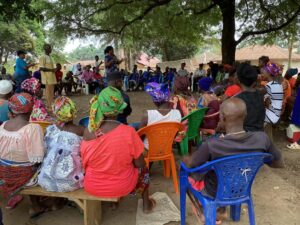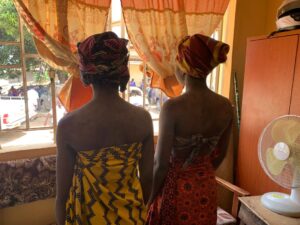Fueling a growing movement against FGM in Sierra Leone

Female Genital Mutilation (FGM) remains a grave issue affecting millions of women and girls worldwide, particularly in Sierra Leone, where the practice is deeply rooted in cultural traditions. Despite its severe physical and psychological consequences, FGM/C persists due to societal pressures and a lack of legal protection. On this International Day of Zero Tolerance for FGM, Women’s Action for Human Dignity – Sierra Leone (WAHD-SL) reaffirms their commitment to eliminating this harmful practice through advocacy, education, and community-driven initiatives.
The Reality of FGM in Sierra Leone
Sierra Leone lacks a specific law criminalizing FGM, leaving countless women and girls exposed to the risk of this practice. A temporary ban was imposed in 2014 due to the Ebola crisis but was later lifted. The practice remains widespread, especially in the northern regions, where it is upheld by social norms. According to the Demographic and Health Survey (DHS), 95.5% of affected women undergo FGM at the hands of traditional practitioners. The absence of legal frameworks and government intervention has created a critical gap in protection (UNICEF, 2023).
WAHD-SL Strategy to End FGM
WAHD-SL is actively working to combat FGM through its flagship project, In Her Shoes, funded by the African Women’s Development Fund (AWDF). This initiative aims to shift social norms and empower communities to abandon harmful practices. The projects core activities include:
- Educational Workshops and Advocacy Forums: Partnering with women-led organizations, civil society groups, and community leaders to amplify awareness and enhance advocacy efforts.
- Engagement with Traditional Practitioners (Soweis): Forming Soweis’ Associations to help practitioners transition to alternative means of livelihood.
- Community-Led Dialogue Sessions: Hosting discussions with ‘positive deviants’—individuals who have rejected harmful traditions—to share experiences and propose solutions.
- Training and Capacity Building Initiatives: Providing healthcare workers, traditional birth attendants, and youth advocates with knowledge and skills to promote alternative rites of passage and safeguard girls’ rights.
- Collaboration with Religious and Traditional Leaders: Empowering influential figures to champion women’s rights and advocate for legal reforms.
Transforming Communities: Key Achievements and Challenges
WAHD-SL’s initiatives have significantly increased public awareness, strengthened community engagement, and fueled a growing movement against FGM. Key lessons from this work include:
- The active involvement of community and religious leaders is crucial for dismantling long-standing traditions.
- Offering alternative economic opportunities to traditional practitioners helps reduce their reliance on FGM as a source of income.
- Youth participation is essential for ensuring generational change and sustaining advocacy efforts.
- Continuous legal advocacy is necessary to push for national legislation banning FGM.
Despite these successes, challenges persist. Cultural resistance and a lack of political will continue to slow progress. However, through sustained education, advocacy, and policy reforms, the structures that perpetuate FGM can be dismantled.

A United Call for Action
On this International Day of Zero Tolerance for FGM, WAHD-SL calls on governments, civil society, and international organizations to strengthen efforts against this human rights violation. To accelerate progress, we advocate for:
- Legislative Action and Policy Reforms: Governments must enact and enforce laws that criminalize FGM.
- Sustained Funding for Grassroots Initiatives: Increased financial support is needed to sustain awareness campaigns and community-based interventions.
- Strategic Partnerships with Traditional and Religious Leaders: Engaging influential figures can help transform societal attitudes towards FGM.
- Comprehensive Awareness and Advocacy Programs: Providing resources and training for women, girls, and communities is vital to fostering long-term change.
Together, we can create a world where women and girls are free from the dangers of FGM.
***
References and Further Reading:
The contents of this article are from Women’s Action for Human Dignity – Sierra Leone (WAHD-SL), an AWDF grantee partner Sierra Leone supported under the Leading from South initiative.
